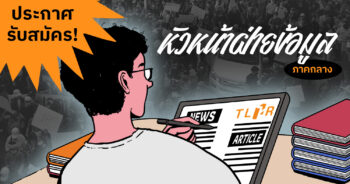“Collapsed Rule of Law: The Consequences of Four Years under the National Council for Peace and Order for Human Rights and Thai Society”
An abridged summary of a report by
Thai Lawyers for Human Rights (TLHR)
It is now four years since the National Council for Peace and Order (NCPO) seized power via coup on 22 May 2014, and still the NCPO lingers on. It has subjected Thailand to the whims of the military for the longest period since the strong rule military governments in the 1960s and 1970s. It has given rise to a plethora of violations of the people’s rights and freedoms and has seen the emergence of deeply entrenched and extensive structures to shore up the coup in every milieu of society. People live in this protracted tension.
TLHR has explored and compiled information and made recommendations on this quagmire in the past four years. In this abridged summary of its four-year report, it addresses three main issues: (1) the unique political and legal aspects of the NCPO era, (2) the state of human rights violations in the past four years; and, (3) recommendations by TLHR to address the draconian powers and fallout of the NCPO.
1. Unique political and legal aspects of the NCPO era
The NCPO regime is unique among dictatorships which had been ruling in Thailand. This is because of its prolonged ruling since 2014. It has been resulting in three different respects which will be rooted in Thai society: (1) use of a military mindset and approach to manipulate and control civilians, (2) its incorporating of absolute military power in constitutional provisions and (3) its arbitrary rule in the name of “law”.
Society has gradually been subjugated to military rule and the use of a military mindset and approach to control civilians has been normalized. For example, the Peace and Order Maintenance Command (POMC) has been established as a major apparatus to contain and manage political problems. And from our information, the military authorities have made a watch list of individuals who they claim are ‘targets’. Their individual profiles have been compiled. Some 303 individuals have been prosecuted as result of their exercising of freedom of expression related to the coup, resulting in 151 legal cases to date.
Powers of the coup makers have been transferred and incorporated into the legislature, the executive and the judiciary. Military personnel have been appointed to take charge in key ministries, with administrative powers that incur lasting obligations to the country well into the future. From our information, the NCPO has decreed 208 orders including 128 notifications. By invoking Section 44 of the 2014 Interim Constitution, it has issued more than 188 Head of the NCPO Orders. Such Notifications and Orders decreed by the coup makers shall remain effective in the future, even after the NCPO is no longer in power.
2. The state of human rights violations in the past four years
In terms of the state of human rights violations in the past four years, at least 876 individuals have been summoned to report themselves for “attitude adjustment” and at least a further 417 have been subjected to harassment, intimidation and surveillance. As the result, at least 1,138 individuals have been violated because of both measures mentioned above. The violations appear in different forms including (1) being summoned / detained in military barracks or subjected to home visits, (2) restriction of and intervention in public events, (3) suppression of media and information sharing, (4) restriction of the exercise of community rights and freedom of expression by local communities and (5) torture and incarceration of civilians in military prisons.
A unique aspect of human rights violations in this era is the attempt to harass political dissents by using the “judicial process”. It has also been used in different ways to restrict freedom of expression of the public as well. In addition to these violations, in many cases, military personnel have opted to become direct parties to cases by taking people to court. They have either enforced the existing Penal Code more stringently or have distorted the aims of the laws to suppress dissents. From our information on the use of “Sedition-like” offence in Section 116 of the Penal Code, this Section has been invoked to charge people in at least 37 cases involving 92 individuals. Attempts to express dissenting or critical voices towards the NCPO or the Head of the NCPO have led to as many as 20 cases. In this way the security of the NCPO regime and the military has been equated to “national security”, even though one could be irrelevant to the other.
An important example is that at least 378 individuals have been charged for violating a ban on political gatherings of five persons and upward, in 50 legal cases. In addition, during certain times, large numbers of people have had to face charges, i.e. during the Referendum on the 2017 Draft Constitution when 142 were prosecuted, or the pro-election demonstrations in early 2018 that saw 106 individuals prosecuted in eight cases. These are prime examples of how the “law” and “judicial process” have been used to stifle freedom of expression, putting a burden on suspects financially, mentally and in terms of the time wasted fighting politically motivated charges.
3. Recommendations by TLHR to address the draconian powers and fallout of the NCPO
TLHR’s recommendations include;
(1) Separating the military and popular sovereignty. The aftermaths of the militarization of civil management and the interference with the sovereignty in governing institutions must be addressed and limited. Role of the military must be separated from the exercise of sovereign power which belongs to the people. Military officials must cease all presence in positions and operations relating to executive and legislative powers, as well as in existing committees.
(2) Managing legal products of the NCPO regime. All legislations issued by the NCPO or the NCPO-established institutions should be reviewed by independence organization. First and foremost, the NCPO’s orders announcements the Head of NCPO’s orders and should be abolished while laws issued by the National Legislative Assembly should be reviewed and shortly revoked some acts related to human rights issues.
(3) Reforming the criminal justice process, instituting a human rights-based approach to encourage the courts to adjudicate to uphold the civil and political rights of the people through a complete overhaul of the judicial system and
(4) Offering remedies to people who have been affected by the use of powers of the military.
(5) All verdicts guaranteeing the success of the coup, granting the NCPO and government officials exemption from legal liability and based on legislations that violate human rights annulled.
On this fourth anniversary of the coup, TLHR wishes this report will be contribute to the effort to move the country forward to a genuinely livable state.
>>> For the full report please download here. <<<


